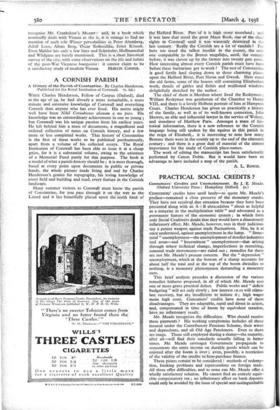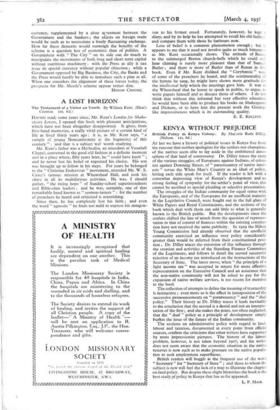PRAC'T'ICAL lc AL SOCIAL - CREDITS 2 Consumers' Credits and
Unemployment. • .13y- Meade. ((Mufti University Press : Humphrey Milford. 5s.) :CoNsumERs' credits have until lateiy-LtO 'quote Mr. Meade's preface—remained a. close preserve cif-thi-'' nionetary cranks. They have not receiveflAue -attenOoni because they have been presentee! 'along with an A abracadabra " about as helpful as al' misprintin the multiplication table " and advocated as a . permanent -.feature 'Of :the..eitotiomk system ; in which form only Sochi] Crocliteers doUbt'that they would have a disastrously inflationary effect. Mr. Meade, however, sees in their judicious osfe a. potent weapon against trade fluctuations. Not, be it at once understood, against unemployment in the lump. " Struc- tural " uneniployment—the uneinployment of derelict industries and areas—and " intermittent " unemployment—that arising through minor 'technical change, imperfections in recruiting, seasonal trade movements—are ruled out ; remedies. for these are not Mr. Meade's present concern. But the " depression " unemployment, which at the bottom of a slump accounts for about half the total and at the top of the boom dwindles to nothing, a monetary phenomenon demanding a monetary cure.
This brief analysis precedes a discUssion of the various remedies hitherto proposed, in all of which Mr. Meade sees one or more grave practical defect. Public works and " deficit budgeting " will act only slowly ; low interest r a:es will stimu- late recoVery, but are insufficient to `initiate it ; high wages mean high costs. Consumers' credits have none of these disadvantages. They are adaptable, rapid and direct in action, and, compensated in time of boom by equivalent taxation, haveOO 'inflationary—result: Mr. Meade recognises the difficulties. Who should receive these payments ? His Working comproinise includes all those insured under the Contributory Pensions Scheme, their wives and dependants, and all Old Age Pensioners. Even so there are 'snags... Those still employed-during. a slump—the majority, after OH-will find their standards actually falling in better times. Mr. Meade envisages ^ Government propaganda to concentrate the extra income on durable goods which can be enjoyed after the boom is over; even,:possibly, a restriction of the validity of the 'crediti to4nre-purchase finance.
Three points rerilain'tO'be considered l methods of redemp- tion, banking problems and repercussions on foreign trade. All three offer difficulties, and to none can Mr. Meade offer a wholly satisfactory solution. He cannot find an entirely equit- able compensatory tax ; an inflationary effect on bank deposits could only be avoided by the issue of special and Untinguishable currency, supplemented by a close agreement between the Government and the bankers ; the effects on foreign trade would be such as to necessitate a freely fluctuating exchange. How far these demerits would outweigh the benefits of the scheme is a question less of economics than of politics. A Government with " The City " on its side can do much to manipulate the movements of both long and short term capital without cumbrous machinery ; with the Press as ally it can issue its special currency without popular objection ; while a Government opposed by Big Business, the City, the Banks and the Press would hardly be able to introduce such a plan at all. When one considers the alignment of these forces today, the prospects for Mr. Meade's scheme appear rather dim.
HONOR CROOME.







































































 Previous page
Previous page